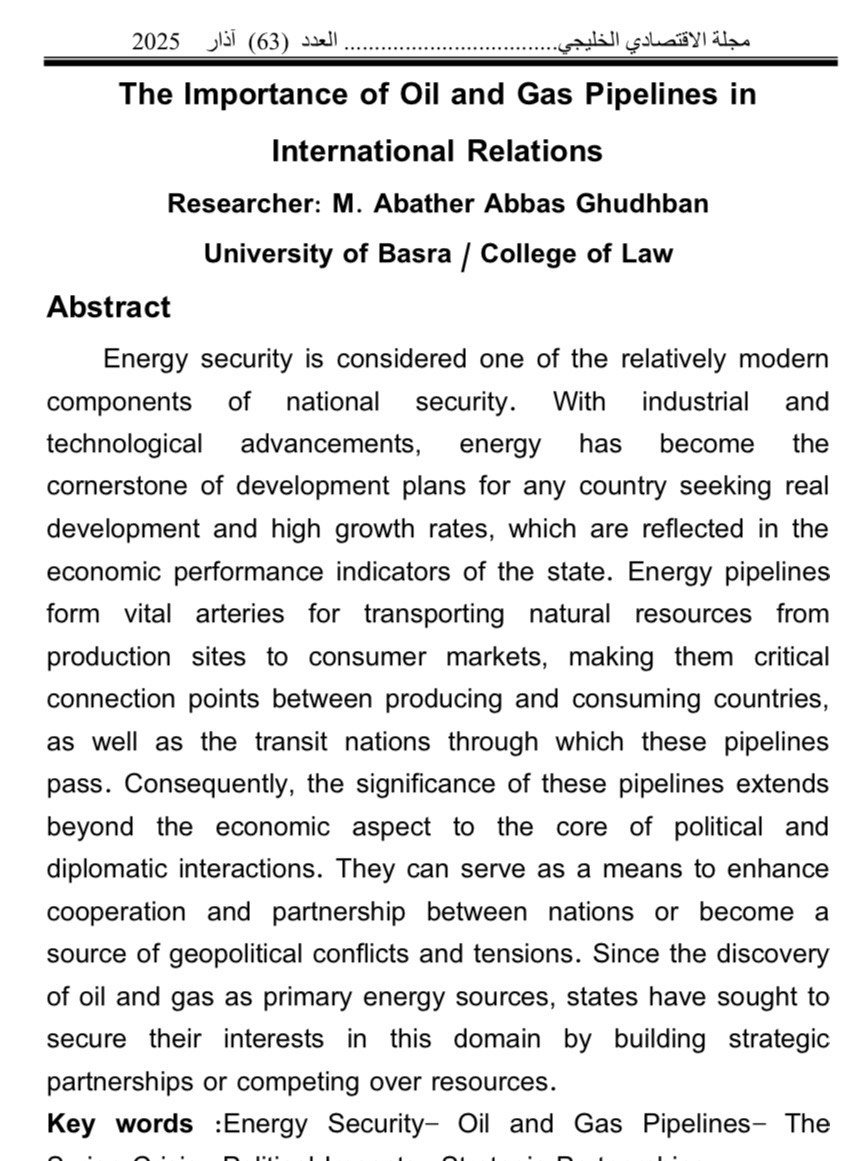The Importance of Oil and Gas Pipelines in International Relations
Main Article Content
Abstract
Energy security is considered one of the relatively modern components of national security. With industrial and technological advancements, energy has become the cornerstone of development plans for any country seeking real development and high growth rates, which are reflected in the economic performance indicators of the state. Energy pipelines form vital arteries for transporting natural resources from production sites to consumer markets, making them critical connection points between producing and consuming countries, as well as the transit nations through which these pipelines pass. Consequently, the significance of these pipelines extends beyond the economic aspect to the core of political and diplomatic interactions. They can serve as a means to enhance cooperation and partnership between nations or become a source of geopolitical conflicts and tensions. Since the discovery of oil and gas as primary energy sources, states have sought to secure their interests in this domain by building strategic partnerships or competing over resources.
Article Details

This work is licensed under a Creative Commons Attribution-ShareAlike 4.0 International License.
References
2009, Article published on BBC website at www.bbc.com.
2010, Report on "The Nabucco Project and Energy Lines in the Middle East", Center for International Studies.
2019, Gas Pipelines Redraw the Map of Alliances, Al-Riyadh Newspaper.
2020, International Energy Agency Report on "The Impact of Regional Conflicts on Global Energy Markets.
Adel Sayed Ahmed,2009, Oil and Gas Pipelines: A Mirror of International Relations, International Politics Journal, Cairo, Issue 177.
Ahmed Sheikho, 2022, Energy Security Challenges in Restructuring Regional and International Relations and Democratic Transition, Research published on https//anfarabic.com, Publication.
Ahmed Sultan,2024, Beyond the Conflict in Syria: A Hidden War Over Natural Resources, Egyptian Center for Thought and Strategic Studies, Cairo.
Amira Tawadros, 2019, Artificial Intelligence Approaches in International Crises, International Politics Journal, Cairo.
Fadel Abbas,2019, The Struggle Over Oil and Gas Pipelines in Syria, Dar Al-Fikr Al-Arabi, Cairo.
Jacqueline Gerges,2022, Cairo: A Key Energy Player with Steady Steps, International Politics Journal, Cairo, Issue 327.
Louay Sayouh, Thulfiqar Abboud, Louay Abu Hussein,2021, International Competition Over Gas: The Pipeline and Supply War, Tishreen University Journal, Economic and Legal Sciences, Issue 5.
Mervat Awf,2021, Limited Normalization: Why is the UAE Trying to Bring Assad Back to the Arab League?, Article published on Al Jazeera website at www.aljazeera.net.
Mohamed Abdullah,2018, The Political Geography of Energy in the Middle East, International Relations Journal, Issue 45.
Mohamed Abu Saree,2018, Energy Conflict and the Reshaping of Global Alliances, International Politics Journal, Cairo, Issue 213.
Mona Suleiman,2018, Dimensions and Implications of the U.S. Withdrawal from Syria, International Politics Journal, Cairo, Issue 215.
Mustafa Alawi, 2016, A New Map: Energy Security Shifts and the Future of International Relations, International Politics Journal, Cairo, Issue 304.
Rasha Sirob,2023, Syria: The Geopolitical Importance in the Oil and Gas Map.
Samira Abdul Razzaq, 2022, The International Struggle Over Oil in the Middle East: Iraq-Syria-Libya as a Model, Al-Nahrain Center for Strategic Studies, Baghdad.
Tamer Mohamed Samy,2023, Energy Security and Its Role in Shaping Regional Relations in Africa (A Comparative Study), Pharos Center for Consultations and Strategic Studies, Cairo.
Camille Brugier; China,s way; the new silk road; www.iss.europa.eu/sites/default/files/.
Goldthau, A., & Witte, J. M. (2010). *Global Energy Governance: The New Rules of the Game*. Brookings Institution Press.
IPCC (2021). *Climate Change 2021: The Physical Science Basis*. Cambridge University Press.
Keohane, R. O., & Nye, J. S. (1977). *Power and Interdependence: World Politics in Transition*. Little, Brown and Company
Klare, M. T. (2008). *Rising Powers, Shrinking Planet: The New Geopolitics of Energy*. Metropolitan Books.
Mearsheimer, J. J. (2014). *The Tragedy of Great Power Politics*. W.W. Norton & Company.
Overholt, W. H. (2008). *Asia, America, and the Transformation of Geopolitics*. Cambridge University Press.
Roberts, J. (2004). *The Transatlantic Energy Relationship: Convergence or Divergence?*. Oxford Institute for Energy Studies
Stulberg, A. N. (2007). *Well-Oiled Diplomacy: Strategic Manipulation and Russia's Energy Statecraft in Eurasia*. SUNY Press.
